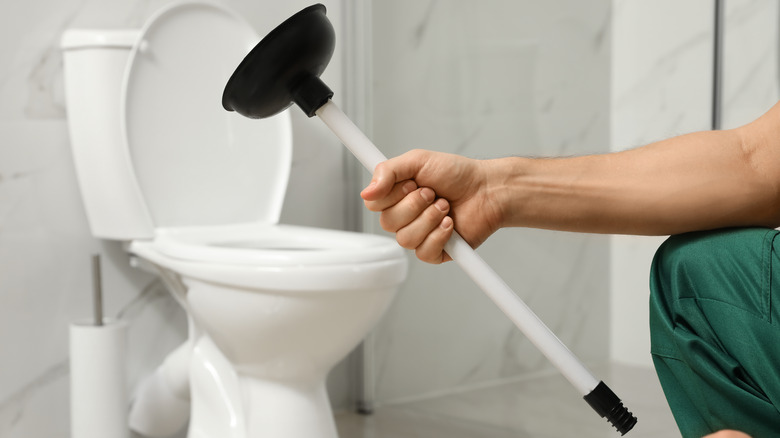Why It Might Be A Warning Sign When Your Poop Won't Flush
After going number two, we want no trace of our business left behind. A quick flush and a spritz of air freshener and it's like it never happened, right? Well, not if your stool has decided to stubbornly stick around. Dispute multiple flushing attempts, if your poop has started to overstay its welcome in the toilet bowl, it may suggest a potential health issue.
Rest assured, a defiant floating poop doesn't always warrant an immediate call to your doctor. Experts at Mount Sinai explain that if a person has recently changed up what they're eating, they may find themselves feeling gassier than usual. When the body produces more gas, this can cause our poop to float rather than sink, making stool more challenging to flush. In time, diet-related floating stool generally resolves on its own.
Certain gastrointestinal infections or gastrointestinal disorders may alternatively be the cause of your particularly buoyant stool. In a 2015 study published in the European Journal of Gastroenterology & Hepatology, researchers found a link between floating stool and patients diagnosed with mixed irritable bowel syndrome (IBS-M). WebMD explains that IBS-M is a type of IBS in which a person experiences regular shifts between diarrhea and constipation.
Poop that's hard to flush may indicate malabsorption
In some cases, stool that refuses to spiral down the drain may point to a malabsorption problem. "Though occasional abnormal stools can occur, if bowel movements frequently resist a flush we have to consider causes of intestinal malabsorption that may lead to excess fat in the stool," Dr. William Palmer, associate professor of gastroenterology and hepatology at the Mayo Clinic in Jacksonville, Florida, told The Healthy.
Medically referred to as "steatorrhea," fatty stool develops when the body's bile acids, digestive enzymes, or the lining of the small intestine are not functioning as they should be, according to an updated 2023 article published in StatPearls. As a result, steatorrhea has been seen in connection with certain related health conditions including celiac disease or exocrine pancreatic insufficiency (EPI). However, a tricky-to-flush poop generally isn't the only symptom present. Excrement is usually also large, loose, pale in color, and particularly foul-smelling — this may include poop that smells like fish.
When to speak to a doctor about your poop
While stubborn floating stools are not indicative of a health issue on their own (per Mount Sinai), if you experience additional symptoms, it may be time to consider making that call to your doctor. As previously mentioned, this includes symptoms of malabsorption such as greasy, pale, or pungent poops. Your healthcare provider can confirm a steatorrhea diagnosis using laboratory testing, clinical investigation, and imaging techniques (via StatPearls). Your physician may also suggest an endoscopy and biopsy to determine the underlying cause.
If you're struggling to get rid of the evidence after a bowel movement, know that this is not unusual from time to time. "The occasional sticky or flush-resistant stool can happen with certain dietary misadventures," Dr. Palmer told The Healthy. "[B]ut recurrent or continued symptoms with associated bleeding, weight loss or other symptoms should be evaluated by a gastroenterology specialist." Dizziness, fever, or any unusual changes in the look, frequency, or consistency of one's bowel movements should also be brought to the attention of your doctor.



